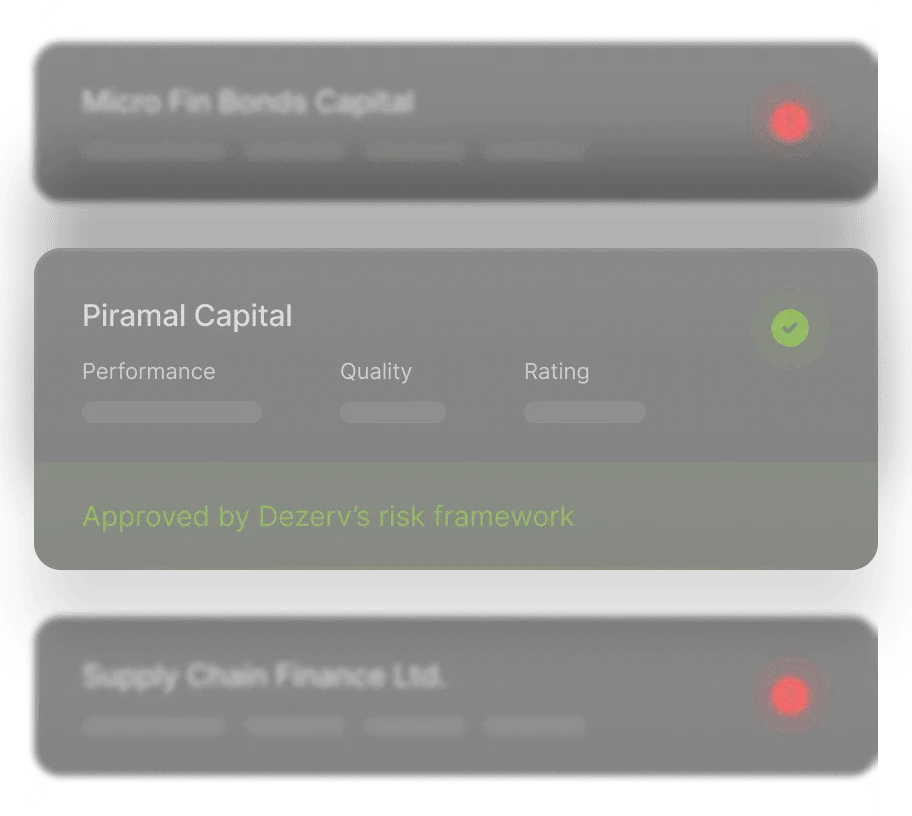The information provided are for general consumption only. Do not construe this as an offer/advice/research to buy/sell any securities
Corporate Bonds
Corporate bonds are bonds issued by private and public corporations. Corporate bonds may be issued by a corporation to fund a new project or purchase new equipment that enhances productivity. Unlike government bonds which are risk-free, corporate bonds are not. This is because the government can print money and repay its bond holders, but corporations must continue to generate profits to repay their bond holders. Within the corporate sector each company has a specific credit rating that helps investors assess the riskiness of lending to a certain company.
Filters
Showing list of 15,859 bonds
What are Corporate bonds?
Corporate bonds in India represent a compelling facet of the investment landscape, offering an intriguing blend of potential rewards and manageable risks. Unlike government-issued bonds, corporate bonds are issued by companies – both from the private sector and public sector undertakings (PSUs). These financial instruments not only diversify an investor's portfolio but also potentially offer higher returns than traditional fixed-income assets.
Corporate Bonds in India
Corporate bonds, as per the Companies Act of 2013, are issued by corporations which are artificial legal entities formed for business purposes. The landscape of corporate bonds in India is diverse, encompassing Private sector bonds and PSU bonds. Each type brings its unique attributes and risk profiles, catering to a wide range of investor preferences.
How does a Corporate Bond work?
Investors who buy corporate bonds receive regular interest payments (interest amount is dependent on the investment made and interest rate or coupon rate of the bond) and get their initial investment (principal) back on maturity date or when they sell the bond to another investor. It is important to note that if the bond is sold before maturity, the investor may get an amount greater (capital gains) or lesser (capital loss) than his initial investment. This is also called price risk or interest rate risk.
Types of Corporate Bonds in India
There are two types of corporate bonds based on the issuer type i.e., Private sector bonds and PSU bonds issued by public sector companies.
Another categorization could be based on the credit rating of corporate bonds. Credit rating is an indicator of the bond issuer’s financial strength and repayment capability. It ranges from AAA (highest credit rating) to D (lowest credit rating indicating that the bond has defaulted)
Credit rating of corporate bonds
Credit rating is a way of rating a bond issuer’s financial position and repaying capacity. The range of credit rating is from AAA (highest) to D(lowest). Low risk investors should try to invest in AAA and AA rated bonds only since they are the safest.
Corporate Bonds vs. Government Bonds
While corporate bonds generally offer higher returns than government bonds, they also come with increased risk. This trade-off is a key consideration for investors. For instance, PSU Bonds, with government backing, are perceived as safer than private sector bonds. Notable examples include HDFC Bank and Reliance Industries in the private sector, and UP Power Corporation and HPCL in the public sector.
Examples of corporate bonds
Issued by a private sector company |
Issued by PSU |
|
|
Bond ISIN |
INE477S08100 | INE134E08IO0 |
|
Bond issuer |
||
|
Interest rate |
7.48% |
7.23% |
|
Maturity date |
25/02/2025 |
05/01/2027 |
Are corporate bonds a good buy?
Yes, corporate bonds are a good buy for investors willing to take some risk in the fixed income asset class. This is because corporate bonds are considered to be riskier than government bonds. Simply put, corporate bonds offer higher returns than Government Bonds but are slightly riskier too. If you can handle the extra risk, corporate bonds are a great investment option for you. Many investors prefer corporate bonds over fixed deposits for the debt allocation in their portfolio.
Are NRIs eligible to invest in corporate bonds?
NRIs are eligible to invest in corporate bonds issued by PSUs. NRIs are not eligible to invest in corporate bonds issued by private sector companies.
High yield corporate bonds
Corporate bonds with credit ratings of A and lower offer higher interest rates (and hence yield) than higher-rated bonds. This is to attract investors and compensate them for the higher risk they are taking by investing in these bonds. Hence these bonds are referred to as ‘high yield bonds.’
Taxation of corporate bonds
Taxation on the interest of corporate bonds: Interest earned from corporate bonds is added to your annual income and taxed as per your marginal income tax slab rate.
Taxation on capital gains of corporate bonds: For listed corporate bonds, the long term (more than 36 months) capital gains tax rate is 10% and the short term (less than 36 months) capital gains tax is the investor’s marginal income tax slab rate. For unlisted corporate bonds, the long-term (more than 12 months) capital gains tax is 20% with indexation benefit and the short-term (less than 12 months) capital gains tax is the investor’s marginal income tax slab rate.
How risky are corporate bonds?
Different corporate bonds have different risks. The first risk to consider is the credit default risk which is the risk that the issuer will not be able to make interest payments or return the principal. Investors should choose an issuer with a credit rating in line with their risk level. AAA-rated corporate bonds are safest and should be chosen by the most conservative investors. Further, all bonds are subject to risks like duration risk, liquidity risk, reinvestment risk etc.
Corporate bonds vs Corporate bond mutual funds
The main difference between corporate bonds and corporate mutual funds is when you invest in a corporate bond you invest in a single bond but when you invest in corporate mutual funds you invest in a portfolio of select corporate bonds.
The following table highlights all the important differences between corporate bonds and corporate bond mutual funds.
Corporate bonds |
Corporate bond mutual funds |
|
|
Definition |
Bonds issued by private companies and PSUs |
Mutual funds that invest in AAA-rated corporate bonds |
|
Structure |
Individual bond issued by one company |
A basket of mostly AAA-rated corporate bonds |
|
Suitable for |
Everyone |
Retail investors and HNIs |
|
Risk |
Relatively higher |
Lower because of diversification |
|
Returns |
Potentially higher |
May be lower or higher depending up on the MF |
|
Min. investment |
Rs. 1,000 and higher |
Rs. 500 |
Risks of Corporate Bonds
Various risks are involved in corporate bond investments. Some of the important ones investors should consider are credit default risk, duration risk, liquidity risk, reinvestment risk and interest rate risk. It is important to note that the risks involved in corporate bonds are generally higher than the risks of investing in government bonds.
Corporate Bond Rates
Investing in corporate bonds has a few advantages. The first advantage is that the corporate bond rates are higher than the government bond rates. However, corporate bonds are riskier than government bonds. Bonds with higher credit ratings like AAA Rated Bonds or AA Rated Bonds are only slightly riskier while bonds with lower credit ratings (A and below) are way more riskier.
Are corporate bonds better than FDs (fixed deposits)
For some investors, corporate bonds may be better than fixed deposits. If you are okay with taking a slightly higher risk, you can consider corporate bonds instead of fixed deposits. For this risk, you will get higher returns as well as relaxed taxation (if you hold the bond for 3 years or more).
How to identify the best corporate bonds?
Different corporate bonds are suitable for different investors. Corporate Bonds with AAA and AA credit ratings are best for investors with low tolerance for risk. Investors with higher risk tolerance would find A or even BBB-rated corporate bonds to be the best for them. Investors should also consider the yield and interest rate offered and align the maturity date with their investment horizon to identify the best corporate bonds for themselves.
Corporate bonds in India present a unique investment opportunity. They balance the potential for higher returns with different levels of risk. It's important for every investor, whether experienced or new to bonds, to grasp the details of these investments. Staying informed about market trends and seeking advice from financial advisors can help you shape an investment strategy that fits your needs.


